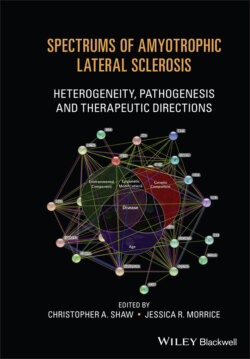Читать книгу Spectrums of Amyotrophic Lateral Sclerosis - Группа авторов - Страница 38
Sporadic vs. Familial
ОглавлениеHistorically, a patient without a family history of ALS was designated as sporadic, while those with at least one relative with ALS were familial cases. Despite different genetic backgrounds, sporadic and familial ALS patients have the same spectrum of signs and symptoms. For a disease that has a very low prevalence and a short duration (onset to death), accurate family history likely is not recorded for many sporadic ALS patients [74–76]. Further, while the population risk of ALS in relatives of sporadic ALS patients is up to eight times greater than the general population, an individual has a far greater chance of having a fatal heart condition or cancer [77] and would therefore never be considered in an ALS pedigree.
It might be possible to re‐classify ALS into either known‐genetic or unknown‐genetic causes. Causal variants are found in similar genes in both familial and sporadic ALS [4]. This overlap is more pertinent to the penetrance or average age at onset of specific variants than it is for whether a variant leads to sporadic or familial ALS. However, the distinction between familial and sporadic has been historically helpful in finding new genes. Families with autosomal‐dominant ALS and sufficiently early age at onset to avoid unaffected carriers have allowed the discovery of the most penetrant and severe variants. Conversely, the sporadic model of ALS has allowed the discovery of de novo variants, those that arise from the germline cells of the parents [78]. While a very rare cause of sporadic ALS, validated and repeatedly observed de novo variants in FUS (primarily the p.P525L variant) [79, 80] have been reported. Whether familial/sporadic or known/unknown cause is the better choice to describe ALS inheritance will require more genetic research.
